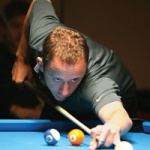The Big Time
It’s been 10 years since the International Pool Tour died. How will history judge the short-lived $13 million venture that showed the promise and peril of attempting to bring pool into the big time?
By Nick Leider
It almost seems like a fever dream, now that it’s been a decade since its death. The International Pool Tour, founded and funded by infomercial maven Kevin Trudeau, held four events in 14 months that awarded more than $6 million in prizes. Pool had not seen — and most likely will not see — anything like this in the history of the sport.
Efren Reyes, winner of two tournaments, pocketed $765,000. The matches were live broadcast across Europe in primetime. Players were told of guaranteed income in the six figures.
But now, 10 years after the IPT’s final event, the World Open, left players with little more than IOUs for $3 million, Billiards Digest revisits the IPT’s unbelievable rise and equally astonishing fall. While setting the record straight on what remains one of the most controversial eras in modern pool, one question begs for an answer:
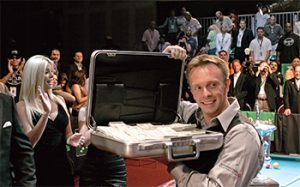
Though short-lived, the IPT still showered pros like Thorsten Hohmann with briefcases full of cash.
What was the IPT’s lasting effect on the game we love?
The Facts
Before telling the story of the IPT, it’s imperative to present the facts that are often lost in the legend of the IPT.
First, every player who won money received what they were due. The $3 million in prizes from the World Open, the abbreviated tour’s last stop, were awarded, though it took 14 months and a series of installments to meet the tour’s obligations.
Second, players did lose $2,000 paid to play in qualifying events for a tournament that never happened. The IPT postponed and then cancelled its future events, leaving those who had ponied up that qualifier money without recourse.
“Some players received that money back and others did not,” said Deno Andrews, the IPT tour director who handled day-to-day operations. “I can’t remember how many ended up losing that money. It was not that many players — with that said, any [number] more than zero was too large.”
Finally, among the top players who competed on IPT, the consensus was that, despite the missteps, broken promises and eventual failure, it was a good thing while it lasted.
“My brothers on tour, we were all really happy about Trudeau and the IPT,” said Rodney Morris, who earned $150,000 with a runner-up finish at that maligned World Open. “We made some money and we had a great time. We were more than happy to be a part of it. We wished things would’ve worked out, but I have nothing against anyone.”
Thorsten Hohmann, who netted $350,000 by winning the North American Open, agrees.
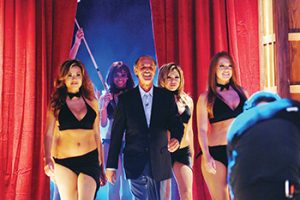
Trudeau’s events were lavish affairs, brimming with pomp and circumstance, as showcased in the Battle of the Sexes match between Loree Jon Hasson and Mike Sigel.
Still, the IPT, coming on so strong and crashing so quickly, affected much more than players’ bank accounts. To see these impacts, it’s worth starting at the beginning.
The First Time
The World Championship Open (Aug. 20, 2005)
Trudeau’s entry into professional sports was a moment of serendipity for pool, a bit of luck for a sport that desperately needed it. The women’s game, buoyed largely by the WPBA Classic Tour, was in decent shape, with events regularly appearing on ESPN and top players able to support themselves with tournament winnings. The men’s side, though, had little as far as organization. The Professional Billiards Tour Association had collapsed in the decade prior. Outside of a few big world championship tilts and the annual U.S. Open 9-Ball Championship, organization was minimal and cooperation was almost nonexistent.
The seeds of the IPT, though, were planted a decade earlier in 1994. Trudeau was already a successful businessman, but he was not yet riding what would be a wave of commercial success based largely on his “Natural Cures” brand, including a New York Times bestselling book and ubiquitous late-night infomercials. Long a fan of pool, he caught a radio advertisement for an exhibition in the Chicago area featuring Hall of Famer Mike Sigel.
“Kevin got in touch with me saying he wanted personal lessons,” Sigel said. “We became friends and I would see him every few weeks. And then I got it in my mind. I said, ‘Hey, you got all this money and you love pool. Let’s do something for the game.’
“I nagged him for 10 years, saying we should do something together. Finally, one day when we were playing pool, he said, ‘Let’s do it.’”
The two scribbled down some notes about prize money. Sigel imagined top prizes around $100,000, with other top finishers pocketing proportionally big bucks. Trudeau, though, had bigger ideas from the start.
“He looked at all that, without even adding it up,” Sigel said, “and he said it’s got to be bigger. For him, from the start, it wasn’t a matter of doing something. It was a matter of how big it was going to be.”
Eventually, the plan was to hold a kickoff challenge match in August 2005 between Sigel and fellow Hall of Famer Loree Jon Jones in Las Vegas. Dubbed the World 8-Ball Championship, the battle of the sexes paid the winner $150,000 with a consolation prize of $75,000. Trudeau threw a lavish party the night before the event, replete with celebrities. On the day of the Sigel-Jones match, the celebrities (actors Paul Sorvino, Allison Janney and Anthony Anderson, rapper DMX and boxing legend Thomas Hearns among them) entered the arena in true red carpet style.
Deno Andrews was taken with Trudeau’s insistence on this being like nothing pool had seen before.
“Everything had to be big. We did nothing half-assed,” Andrews said. “What gets him going is entirely different than what gets the rest of us out of bed. He wanted it big and he wanted it immediately.”
By August, the IPT had crash-landed on the pool world.
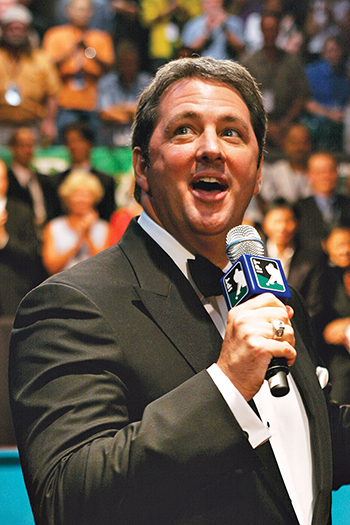
With media maven Trudeau at the helm, “everything had to be big.”
If a guy wanted to get pool players’ attention, big money and bright lights aren’t the worst ways to do so.
The Best of Times
The King of the Hill 8-Ball Shootout (Nov. 30-Dec.4, 2005)
The North American 8-Ball Championship (July 22-30, 2006)
The IPT initially started with 150 players hand selected by Trudeau and the IPT brass. Potential tour members had to apply for a spot on this lucky list, which may be the first and only time pool players put together resumes en masse.
A group of players automatically qualified based on past performance. Think Johnny Archer, Efren Reyes, Rodney Morris and other world-class talents. A dozen living Billiard Congress of America Hall of Famers received automatic entry and a $30,000 bonus simply for being part of the tour. Other players had to apply to tour membership. Darren Appleton, then a professional English 8-ball player but largely unknown in the U.S., emailed his application to the tour hoping that his unmatched record in a slightly different discipline would earn him a spot. (It did.)
The King of the Hill event, however, would only see 42 players compete for the $1 million prize fund, with $200,000 going to the winner. Still, the IPT managed to get all 150 players to Orlando for the event, because a mandatory players meeting promised to detail just what the tour had in store for its first year.
“It was the greatest speech I’ve ever heard,” said Thorsten Hohmann, of Trudeau’s pitch to the players. “It was incredible. I wasn’t really too aware of everything until I got to Orlando and heard Kevin. That made me realize: Holy shit. This is something big.”
Appleton, whose involvement with the tour led to him ditching English 8-ball for the American variety, was equally blown away.
“That players meeting, [there] was amazing excitement. I felt like a professional sportsman,” he said. “This was the biggest thing to happen for pool.”
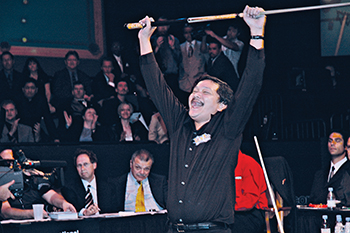
Reyes scored pool’s biggest ever prize.
Six months later, the North American Open brought 200 players to the Venetian in Las Vegas for a chance at the $2 million purse. The top prize was $350,000, the biggest single payday in the history of pool. EuroSport was broadcasting the event live in primetime. Deals were made with Outdoor Living Network to replay the matches for North American audiences. Before a ball was struck, this event was the most significant tournament in years.
The grueling round-robin, multi-round format had players playing four or five race-to-8 sets a day, often clocking more than 12 hours at the table. Hohmann eventually prevailed over Filipino snooker convert Marlon Manalo. But what happened on the table took a backseat to the event itself. The bright lights, the professional production, the class of such an event seemed to mark pool’s arrival as a legitimate sport.
But just two months later, at the IPT’s fourth event, the wheels fell off what everyone thought was pool’s gravy train.
The Worst of Times
The World 8-Ball Championship (Sept. 3-9, 2006)
The World 8-Ball Championship began with Trudeau announcing the cancellation of a scheduled event in London, which had some of the 200 players nervous about what was to come. Regardless, the $3 million prize fund went a long way to relieving any anxiety among the players.
The grueling tournament schedule, again having players compete nearly nonstop for days at a time, left Rodney Morris facing Efren Reyes for the $500,000 top prize. The on-table action ended with the Filipino legend pocketing the top prize while Morris “settled” for $150,000.
Or so it seemed.
All the players left the Grand Sierra Resort and Casino in Reno, Nev., with nothing. Players walked away with promises of future payments, but concerns that were raised at the players meeting became very real for those with a stake in the game.
“That Sunday, Kevin came to me and said the money wasn’t in the bank,” Andrews said. “I’ll never defend him not paying the players. That was wrong and it will go down in history as wrong. But I told him, 100 percent, he needs to pay the players and he said he would.”
Rumors circulated about a proposed deal with Stanley Ho, a billionaire casino magnate based in Hong Kong, to buy the tour. The supposed windfall from this would have supported the tour’s future, Trudeau insisted. But an agreement never materialized. Also, on Oct. 13, 2006, President George W. Bush signed into law the Unlawful Internet Gambling Enforcement Act, which outlawed wagering over the Internet for individuals in the U.S. This, according to the IPT, impacted the tour’s ability to market itself to potential buyers.
Over the course of 14 months, in nine installments of 11 percent, the payments arrived. All the while, no further tournaments were scheduled. The IPT staff, once more than 20 people, was slashed to a skeleton crew of five. Unable to produce profits through events, Andrews pivoted to reducing costs and raising what revenue he could through streaming recorded matches online, selling DVDs and collecting TV and product royalties.
The money wasn’t flooding in, but it was substantial enough to cover roughly half the amount owed to players, according to Andrews, with Trudeau covering the remainder.
“He could’ve filed for bankruptcy,” Andrews said. “He could’ve stiffed the players, but two months after that tournament, I did everything I could to persuade him to commit to paying the players.”
While the payments trickled out, the IPT held seven challenge matches, one-on-one events that were streamed online. The response was tepid and a steep decline from the glitz and glamor of the major tournaments that preceded them. The tour continued on in a sense, but it was evident to everyone within the sport that the IPT of 2007 was a far cry from what the tour had been just months before.
With the future of the IPT falling well short of expectations, Sigel took issue with players who quickly lost faith in the IPT.
“When players started knocking [Trudeau], I couldn’t believe it. That has to leave a bad taste in your mouth,” he said. “That’s when I thought, if it was me, I wouldn’t pay them and just go bankrupt. But he paid him. That’s the kind of guy he was.”
Andrews, however, puts blame on those around the game.
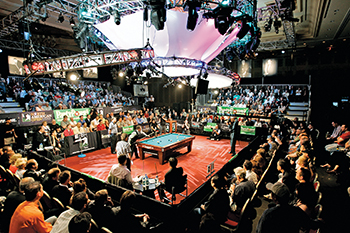
No expense was spared in the production of IPT events, including a sparkling arena to dazzle the masses.
Regardless of where blame lies, those who had the most to gain from the IPT adventure felt a real sense of loss once it was clear things weren’t going to turn out as advertised.
“I had a chance to win $500,000 and then I had to go try to win $10,000?” Morris said. “I lost a lot of motivation. I did a lot of soul searching at that time. For about a year there, I didn’t know what I was going to do. I was depressed for a while.
“It was real hard. I didn’t want to play at all. For a year, I was in a coma. I could’ve been on the “Walking Dead” — just walking around without an idea.”
Hohmann, another player who had profited immensely from the IPT’s short run, expressed similar feelings.
“It wasn’t like the tour ended at once,” he said. “It was a bit of a slow death — them dragging it out with exhibition matches. Of course I fell into a slump … It took me a few years to recover from that. You have these high expectations and then you’re back to playing in tournaments where you’re walking away with $2,000. It was hard.”
The End of Times
Once the players had been paid in full, Andrews met with Trudeau to discuss the IPT. More than $13 million had been invested, including prize money, production costs and marketing. The operation, already stripped to its bare minimum, was barely paying for itself.
The IPT, as it had been packaged from the beginning, was all but dead and buried. At that point, pool’s golden goose decided to pull the plug.
The slow death, as Hohmann put it, had come. But now, in 2016 and a decade after the cash was stacked on the pool table at the first event, the question still remains: Was the IPT a net positive or negative for pool?
“It was good,” Sigel said. “To this day, I defend the IPT whenever I hear someone talk about it. Add up all the money in the years before and after and it won’t come close to the $13 million Kevin put into the game.”
Sigel, who first hatched the concept of the IPT, agrees with Andrews, who was involved in the execution of that idea.
“Ultimately, it was good,” Andrews said. “If you remember what it was like before the IPT, it was very similar to what it is now. It was exactly like it is today … We created an entirely alternate universe for pool. It happened in a vacuum and ultimately I don’t think it had much of an effect on pool. It didn’t impact the actual state of the sport today.”
“He invested an amazing amount of money and it was great,” Appleton said. “I started playing American pool because of the IPT. I have that time to thank for my career and everything I’ve achieved since then.”
“Pool players can be some of the most loyal, trusting and straightforward people,” Andrews said, who continued to work with Trudeau until 2013. “Really the promoters are goofier than the players. The players show up, they pay their expenses, they pay the entry fees, they practice. They do all this stuff, and it’s such a basic thing: Pay them on time.
“I still hear about this. The money isn’t there or the added money was different than what was published … We were as guilty as anybody, but the players were overwhelmingly supportive.”
Van Boening Tops at Super Billiards Expo
But with a new venue and new format, the champion remained Shane Van Boening. The reigning Player of the Year took his fourth Pro Players title, and second in a row, with an impressive run through a field of 61.
Starting with wins over Donnie Mills and Robb Saez, Van Beoning then ran into 2011 champ Ralf Souquet. The American dropped the second set, 8-6, but bounced back with a clinching 8-2 set to advance to the quarterfinals.
Souquet was hardly the only big name to be sidelined early. Efren Reyes drew German superstar Thorsten Hohmann in the first round — and the Filipino legend dropped consecutive sets to end an uncharacteristically quick event. Johnny Archer, Francisco Bustamante and Mika Immonen also crashed out before winning two sets.
In the quarterfinals, Van Boening took two close sets against Darren Appleton; Warren Kiamco edged Corey Deuel; Alex Pagulayan thumped Jeremy Sossei, and Hohmann outlasted Scotland’s Jayson Shaw.
In a rematch from the 2003 World Pool Championship, Hohmann took his spot in the final by edging Pagulayan. Van Boening then topped Kiamco in straight sets, 8-6 and 8-5, to take the other seat in the championship match.
Van Boening struck first in the final, taking the opening set, 8-6. He then worked his way to within a 10-ball of the title in the second when he got on the hill, 7-6. But Hohmann responded with a pair of racks to force a decisive third set.
In the final race-to-8, Van Boening turned a 3-2 lead into an insurmountable 7-2 advantage. Hohmann took a pair of racks to edge within shouting distance at 7-4, but Van Boening then broke and ran the 12th table for the 8-4 win.
His second consecutive Pro Players title netted Van Boening $10,000 while Hohmann pocketed $5,000 for his runner-up finish.
U.S. Open: Van Boening in Hot-Seat
VIRGINIA BEACH, Va. — Despite their much heralded domination of professional pool in the past two decades, the Philippines has collected just two U.S. Open crowns, with Efren Reyes’s win in 1994 and Alex Pagulayan’s 11 years later. But that seven-year winless streak looked a good bet to end, when five of the six remaining players at this year’s event had connections to the island nation.
A Pinoy champion, though, will have to go through Shane Van Boening. The American throttled Pagulayan in Saturday afternoon’s hot-seat match. Clearing six racks from the break, Van Boening sprinted away from his frequent foe, eventually taking the match, 11-5.
The left side of the bracket, meanwhile, looked like a mini-tournament in Manila. Efren Reyes topped Ronnie Alcano late Friday evening, 11-9, in what was an uncharacteristically sloppy match. Dennis Orcollo bested Jose Parica, 11-4, in a one-sided set where the 63-year-old appeared to tire after a thrilling run deep into the tournament.
On Saturday afternoon, Orcollo then faced Reyes, with the winner then getting Pagulayan in the third-place match. Though making fewer and fewer trips to the United States in recent years, 58-year-old Reyes electrified the crowd with his play throughout the U.S. Open’s first week.
The greatest thrill came in his 11-10 victory over two-time defending champ Darren Appleton. Facing a tricky kick shot on the 4 ball in the case game, Reyes sent the pink off three rails and into the 9 ball, which then crawled into the side pocket for the win. From there, Reyes topped China’s Wang Can and Orcollo, before losing to Pagulayan.
In a left-side rematch with Orcollo, the Magician was unable to find a rhythm. Orcollo opened up an early three-rack lead, which he maintained until the final 9 ball fell for an 11-8 win.
With Van Boening now resting until Saturday night’s final, Pagulayan and Orcollo are facing off for the second seat in the championship set. Orcollo holds and early 4-2 lead in the modified race to 11.
Van Boening Takes U.S. Open Title No. 2
VIRGINIA BEACH, Va. — Dennis Orcollo is arguably the best tournament player on the planet. But in the final of the U.S. Open 9-Ball Championship, he barely stood a chance. Shane Van Boening, riding a break that bordered on the sublime, blasted his way past the Filipino powerhouse to take his second U.S. Open crown by a count of 13-7.
The 29-year-old American jumped out to an early 9-2 lead in the modified race to 13. Winning eight straight at one point, Van Boening dropped a ball on the break seven straight racks, four of which he cleared without letting Orcollo to the table. Following a scratch on the break in the 12th game, Van Boening’s only unsuccessful break in the set, Orcollo made an impressive run of his own, closing the gap to just 9-7. But a missed table-length jump on the 1 ball was the end of Orcollo’s road. Van Boening cleared that rack, then broke and ran the final three for an emphatic stamp on his U.S. Open victory.
“I’ve been playing a lot of pool the last month or so,” Van Boening said, shortly after his victory. “I felt really good coming here. I had a lot of confidence and started out [playing well].”
His path through the winners bracket and into the hot-seat included a number of world-class players, only one of whom managed to stay with the two-time BD Player of the Year. In his third match, Van Boening throttled Mosconi Cup foe Nick van den Berg, 11-4, before besting Chris Melling by the same count. In the next round, he faced Ronnie Alcano, his opponent from the 2007 U.S. Open final. The lanky Filipino stood within a rack advancing, but Van Boening collected the final two racks for a thrilling 11-10 win.
That would be his one and only close call. Two more Filipinos fell, with Van Boening topping Jose Parica and Alex Pagulayan, both 11-5, to take his spot in the final.
On the one-loss side, Orcollo was gathering steam after his loss to Efren Reyes. He won three straight, including an 11-7 victory that ended Darren Appleton’s hopes for a third straight Open crown, to earn a rematch with Reyes. The 58-year-old legend was the story of the tournament’s opening week, but Orcollo was too much. He sent Reyes packing, 11-8, before eliminating Pagulayan in third place.
While Van Boening and Orcollo are far from strangers — the two frequently match up in money games — the American would not be denied. With title no. 2 at just 29, Van Boening didn’t waste time looking forward, if only in jest.
“What do I need, three more to tie Earl?” he said, acknowledging Earl Strickland’s record five U.S. Open titles.
If he can come anywhere close to replicating his dominant form over the past week, though, the joke might be on his competition.
Dozen Remain in U.S. Open Hunt
VIRGINIA BEACH, Va. — If you’re looking for story lines at the 2012 U.S. Open 9-Ball Championship, the winners-side final four should provide plenty. Efren Reyes, Jose Parica, Alex Pagulayan and Shane Van Boening remain unbeaten. Young vs. old, Philippines vs. U.S., former champions chasing titles or an overdue contender closing in on his crown, the final 24 hours of the U.S. Open should be riveting.
Parica, 63, is chasing his first Open title after finished second in 2003. He will face the 29-year-old Van Boening, who has been absolutely dominant thus far. In a superb match against Ronnie Alcano — a rematch of the 2007 final, won by the American — Van Boening erased a late two-rack deficit to take an 11-10 victory.
On the other side of the bracket, Pagulayan and Reyes will square off. The Magician has been nothing short of magical in his march through the right side. He topped two-time reigning champ Darren Appleton, 11-10, on Thursday afternoon, then outlasted Wang Can, 11-7, that evening. On Friday, he then trumped Dennis Orcollo, leader of the Philippines’ next generation of stars, 11-7.
Over on the one-loss side of the bracket, it’s tough to find a player without top-tier credentials. Johnny Archer faces Darren Appleton, with the Englishman plodding through the left side in search of his third straight U.S. Open title. World 9-Ball champ Chang Jung-Lin, China’s Li Hewen and Netherlander Niels Feijen top an impressive international class of hopefuls.
Stay tuned, as updates will be posted as each round of play concludes.
Appleton Loses Bid for Third U.S. Open
VIRGINIA BEACH, Va. — It goes without saying that you can’t win the U.S. Open 9-Ball Championship without a lucky break or two. In the case of Darren Appleton, who went unbeaten on his way to victories in 2010 and 2011, this year’s story took a turn with a very unlucky break. In a Thursday match with Efren Reyes, the Brit watched the Filipino legend fluke in the 9 in the case game. The loss sent Appleton to the left, where his pursuit of a third consecutive title would be much more difficult.
On Friday evening, that pursuit ended with an 11-7 loss to Dennis Orcollo. Like Mika Immonen, who chased the three-peat in 2010, Appleton showed championship mettle, but simply couldn’t muster the magic of the previous two years.
With the win, Orcollo earned a spot opposite Jose Parica in Friday’s last round of matches. The winner, as well as the winner of the set between Ronnie Alcano and Reyes, will be among the final four players to advance to Saturday.
While the eliminations continue, two unbeaten players — former champs Shane Van Boening and Alex Pagulayan — have punched tickets to Saturday afternoon’s hot-seat match. In his set with Parica, Van Boening struggled to get rolling at first. But he built a lead against the 63-year-old Filipino, and eventually ran away with the match, 11-5.
Pagulayan, meanwhile, sprinted to an early lead in his match with Reyes. Taking the first six racks, Pagulayan never relented in his pressure until he dropped the clinching 9 ball for an 11-5 victory.
U.S. Open Primed for Big Weekend
VIRGINIA BEACH, Va. — Heading into the final two days of the 2012 U.S. Open 9-Ball Championships, it’s clear that the strong have survived. At the conclusion of play on the winners side on Thursday night, just eight players remained. And that octet packed plenty of star power.
Former champions Shane Van Boening, Alex Pagulayan and Johnny Archer are all chasing title No. 2. But in perhaps the most thrilling story of the U.S. Open to this point, 58-year-old Efren Reyes strung together five victories — including an electrifying 11-10 win over two-time defending champ Darren Appleton — to put himself in contention for the Open crown. He will square off against countryman Dennis Orcollo on Friday. Pagulayan and Archer will square off in the other match on that side of the bracket.
Scotland’s Jayson Shaw will face 63-year-old Jose Parica on the other side of the bracket. Parica, runner-up at the 2003 U.S. Open, advanced via a dominant victory over a resurgent Earl Strickland, 11-5. The winner of that set will then face the victor in Shane Van Boening’s match against Ronnie Alcano, a rematch of the 2007 U.S. Open won by the American.
While eight players have two bullets left in their revolvers, the left side is packed with championship-caliber talent. Most notably, late Thursday evening, Darren Appleton trailed American Oscar Dominguez. In search of his third-straight title, the Englishman was struggling to rally in the second match after his heart-breaking loss to Reyes.
Leading the charge on the one-loss side, Japan’s Yukio Akagariyama, China’s Li Hewen and Taiwan’s Chang Jung-Lin are major title winners seeking glory on American soil. Europe’s Albin Ouschan, brother of women’s star Jasmin and rising star on the EuroTour, joins England’s Chris Melling in the title hunt. American hopes settle on Corey Deuel, who dropped a Thursday night set to Jayson Shaw, and five-time titlist Strickland.
You Guessed It: Filipinos Reign at First World Cup
The Filipino dream team of Efren Reyes and Francisco Bustamante became the inaugural PartyPoker.com World Cup of Pool champions as they blew away Team USA, 13-5, in front of a packed arena at the Newport Centre, South Wales.
The American duo of Earl Strickland and Rodney Morris were expected to make a match of it, but a combination of bad luck and loose shots on the part of the Americans and unrelenting skill from the Filipinos kept them at bay.
With upwards of 900 people in the arena including a large contingent of expatriate Filipinos, the atmosphere was electric and the tension mounted as the two teams shared the first eight racks of the race-to-13 final.
From there though things unraveled for the Americans. They lost control of the cue ball on the break and consequently found it difficult to get any momentum.
By contrast the Philippines turned up the heat with Reyes in particular playing a series of stunning shots to get out of jail and pot some seemingly impossible balls.
The second half of the match became something of a procession as the Philippines won seven consecutive racks to leave their opponents in no man’s land.
Team USA got one back to take the score to 11-5, but Reyes and Bustamante knocked off the final two racks to take the magnificent silver trophy, the title and a check for $60,000.
“It’s funny that every time there is a new big tournament, I win it, but all week I thought if we could get to the final we can win, said a delighted Efren Reyes after the match.
“The USA is a good team but they were unlucky and that made it easy for us,” he said.
Bustamante was thrilled to take pool’s first ever World Cup event. “In the beginning there was a lot of pressure on us but when we went three games ahead it all lifted,” he said.
“Efren played lots of unbelievable shots; some of them I’ve never seen in my life! That’s why we won.”
For the Americans, Rodney Morris summed up their feelings: “That was pretty disappointing. After 4-4 it didn’t go our way although the match was closer than the score suggested, but when it went to 7-4 we were both pretty deflated and felt it slipping away.”
“We never really got a clear shot off the break and it was a tough hill to climb but they played great – the way they were supposed to, so congratulations to them,” Morris added.
Thirty-one Countries Vie for World Dominance in Wales
National pride is at stake at the PartyPoker.com World Cup of Pool, taking place now at the Newport Centre in Newport, Wales. Pressure is high as the scotch doubles matches are played on a straight knock-out basis.
The first round began on Aug. 22, with 32 two-man teams working together to represent their country. Thailand, represented by Tepwin Arunnath and Amnuayporn Chotipong, fell to Canadians Luc Salvas and Tyler Edey, 9-5. Team Qatar (Fahad Mohammadi and Bashar Hussain) was stymied by Malaysians Patrick Ooi Fook Yuen and Ibrahim Bin Amir, 9-3. And in an inter-continental contest, the Czech Republic, represented by Roman Hybler and Michal Gavenciak, defeated Poland’s Radoslaw Babica and Mariusz Roter.
The Phillipines, represented by Efren Reyes and Francisco Bustamante, were the clear crowd favorites, and rose to the occasion in round one, with a 9-0 massacre over Malta’s Tony Drago and Alex Borg. It was a tight battle between Taiwan’s Wang Hung-hsiang and Yang Ching-shun and India’s Dharminder Lilly and Alok Kumar. The tiny island nation prevailed, 9-6.
England has two teams in the running, one of which is represented by Steve Davis and Daryl Peach. It was 5-5 before the Brits were able to pull ahead of Jeong Young-hwa and Lee Gun-jae of Team Korea. On Davis’ 49th birthday, he joyously accepted their 9-6 victory.
In the second day of play on Wednesday, Aug. 23, Russia’s Konstantin Stepanov and Konstantin Zolotilov starved Hungary’s Vilmos Foldes and Gabor Solymosi of opportunities, defeating them 9-3.
Hong Kong produced a heroic performance to stun sixth- seeded Sweden in the biggest shock thus far in the PartyPoker.com World Cup of Pool. Sweden, whose side consisted of former World Championship finalist Tom Storm and former World Championship semi-finalist Marcus Chamat, had been 4-1, 6-2, and 8-5 ahead in the race-to-9. But the Hong Kong pairing of Lee Chenman and Kong Man-Ho showed their character to win the last four racks to secure a place in the final 16.
Team Japan, Maasaki Tanaka and Satoshi Kawabata obliterated Indonesia’s Imran Ibrahim and Ricky Yang, 9-0. While the English “A” team of Ronnie O’Sullivan and Raj Hundal, didn’t have it quite so easy against Spain’s David Alcaide and Rafael Guzman. The crowd was gutted as the duo fell to a fast 4-0 deficit, but had their hopes back up as England got their nose in front at 8-7, but the Spaniards took the final two racks to close out a famous victory.
Team U.S.A. is composed of Rodney Morris and Earl Strickland, who had a decided victory over Singapore. The home team, Rob McKenna and Ben Davies of Wales, disappointed their fan base with a heart-breaking 9-2 loss to Germany (Thomas Engert and Oliver Ortmann).
Today, Aug. 24, three matches are left to determine the final 16. This morning, Ireland had no luck against Finland’s Mika Immonen and Markus Juva, heading home after a 9-5 loss.
The first matches of round two will begin tonight, with No. 1-ranked Phillipines and No. 3-ranked U.S.A. taking on their respective opponents. For up-to-the minute coverage at www.partypoker.com!
Luat Wins Third Leg of San Miguel Asian 9-Ball Tour
Filipino Rodolfo Luat won the Kaohsuing leg and kept the San Miguel Asian 9-Ball tour crown in the hands of the Pinoys after beating “The Assassin,” two-time world junior champion Hui-Kai Hsia, 11-7, Sunday, Aug. 6 at the Kaohsuing Business Exhibition Hall in Kaohsuing, Taiwan.
The win buoyed the hearts of the Filipinos, who saw their top bets Efren “Bata” Reyes and Francisco “Django” Bustamante crash out of the tournament.
Reyes was ousted by Masaaki Tanaka of Japan, 6-9, late Friday and failed to advance in next round after losing in the point system in the group stage of the first round.
Bosom buddy Bustamante bowed to Hsia, 11-4, in the final-four to prevent an all Filipino final. Luat, on the other hand, nipped Indonesian ramil, 11-8, to arrange a titular showdown with Hsia, whom he beat two years ago, in a 9-2 count, in this country when Filipino-Canadian Alex “The Lion” Pagulayan won the 2004 WPC in Taiwan.
Luat, from Angeles City, Pampanga, who is scheduled to celebrate his 49th birthday on December 12, took an early 6-2 lead in the race-to-11 championships round. From there he won five of six racks en route to winning the leg and claiming the $10,000 top prize. This was Luat’s maiden appearance in Asian tour.
Filipino billiards master Efren “Bata” Reyes (Vietnam) and Ramil “Bebeng” Gallego (Bangkok) topped the first two-legs of this four-cities annual event where the fourth and final leg goes to Jakarta, Indonesia next month.
Aristeo “Putch” Puyat, acknowledged God Father of Philippines billiards, congratulated Luat’s big win, and is hoping that the Filipino cueists will win in Jakarta. “A possible sweep?” he asked.
“I am just lucky because at the end the ball is in my side.” Luat said.
Last year, Filipinos won three of the four legs: Gandy Valle (Singapore), Reyes (Jakarta) and former AZ Billiards Rookie of the Year Ronato “Ronnie Calamba” Alcano (Manila).
Besides the total prize money of US$160,000, the top 10 players on the Tour Order of Merit every year will directly qualify into the World Pool Championship.

